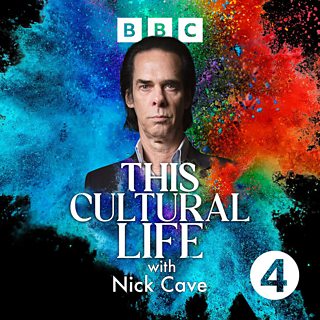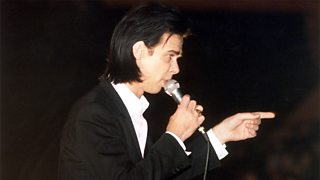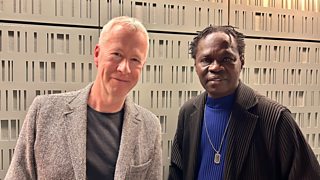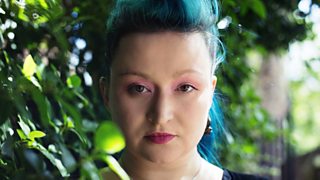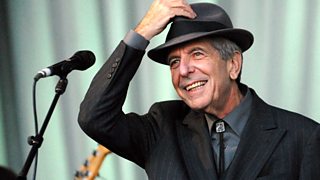Nick Cave: Nine things we learned from his This Cultural Life interview
Nick Cave has been an incredibly prolific musician for over 40 years. He’s released more than 20 studio albums with his bands Nick Cave and the Bad Seeds, and The Birthday Party, as well as a solo studio album, 11 soundtrack albums, and multiple live albums. He’s duetted with artists as diverse as Kylie Minogue, Johnny Cash and Iggy Pop. Nick Cave has also written novels, poetry, a screenplay, and has recently published Faith, Hope and Carnage - a book exploring his ideas about creativity and belief.
There’s an awful lot for him and John Wilson to talk about in this episode of This Cultural Life. In a wide-ranging conversation, they discuss his love of Dame Edna Everage, processing tragedy through music, and why he doesn’t really like writing songs. Here are nine things we learned.
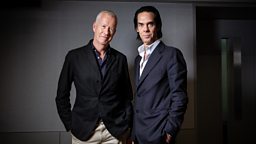
1. His dad sparked his creative passion
Nick Cave was born in Warracknabeal, Australia. Both his parents were in the literary world – his mother was a librarian and his father was an English and maths teacher – so Cave found an interest in writing at an early age. “[My dad] introduced me to all sorts of stuff that, when I think about it now, was extremely radical,” he says. “For example, he read me the first chapter of Lolita when I was 13 and explained why this was great literature… That was a huge moment for me because of the huge closeness I felt to my father.” Cave felt he was his father’s project and was “hugely influenced by him”.
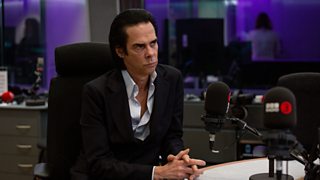
2. His love of music began in church
Religion has been a common theme in Cave’s music and he says his own faith has grown stronger with age, so it’s maybe not surprising that his passion for music began in church, or rather cathedral. “I was in the cathedral choir for three years,” he says. “I don’t know if it ignited something within me – an interest – or if that was already there. I had an uncommon attachment to religious matters, especially the figure of Christ. He always fascinated me. As a kid, I used to like the biblical stories.” As important as it was, he says the choir didn’t do much for his confidence as he was always passed over for better singers. “I never got [solos],” he laughs.
3. Johnny Cash was his first inspiration
Cave says he “didn’t have any understanding of music” as a boy, but that changed the first time he saw The Johnny Cash Show, a TV show in which the country singer performed and chatted to guests. “I remember… understanding suddenly, by watching Johnny Cash, that music could be some other thing. It was dangerous. It was this outlaw guy, ‘The Man In Black’, kind of evil. I think I just started to see music in a different way. It was exciting.” Cash remained a hero throughout his career and they eventually recorded a duet, I’m So Lonesome I Could Cry, shortly before Cash died. Cave calls it one of the highlights of his life. “These are the days, and you don’t have them often, that can’t be taken away.”
4. Dame Edna Everage is one of his heroes
They may be visually polar opposites, but Cave cites Dame Edna Everage, aka Barry Humphries, as a big influence. “I don’t know if you’ve ever seen one of Dame Edna’s shows,” Cave says to John Wilson, “but they are extreme. They are extremely politically incorrect and offensive on every possible level.” He says Humphries was part of a group of Australians who inspired him, people “that were just troublemakers and stirred the cultural pot. Social irritants… Germaine Greer. Clive James, to some extent. David Williamson… the cartoonist Michael Leunig, the artist Brett Whiteley. These people were my heroes because they were a thorn in the side of Australian culture… More than my musical heroes… these people taught me about not just the need to push against things but the great pleasure in doing that.”
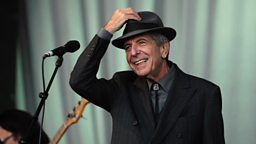
5. Leonard Cohen made him believe he could be a singer
The third major influence Cave mentions is Leonard Cohen. “The sister of my best friend told me to come over: ‘I’ve found this thing and you’ve got to hear it.’ She played me Leonard Cohen’s Songs of Love and Hate. I guess I was 15. I just heard this incredible voice with these incredible words. I think that was probably when I first thought maybe I could do something like this.” He says he heard something in Cohen that “chimed with a feeling I always had inside of me, a kind of melancholy feeling that was always at odds with this Australian country town I grew up in.” He says Cohen may also have been an influence on his singing style. “I never tried to sing like Leonard Cohen, but he had that lugubrious, low, unpushed tone… I can’t help but think there’s some of that in the way that I sing.”
I kind of think rockstars need to be simply drawn. They can’t be too complex.Nick Cave
6. His signature look is down to “laziness”
Cave is one of the most instantly recognisable musicians in the world. Always in a black suit with long, swept back jet-black hair. He says no great consideration ever went into this image. “It’s mostly because I’m kind of lazy and I don’t have much interest in it,” he says. “It’s easy to put a suit on in the morning. I don’t have those thoughts about what I wear. I just wear a suit. I kind of think rockstars need to be simply drawn. They can’t be too complex.”
7. He doesn’t like writing songs
Cave says he approaches song-writing like an office job. “I start writing at 9 o’clock and finish at 5.30 and have a lunch break. It’s the only way I can get a record written. The last thing I want to do on any day is try to write a song. It’s not fun… Being alone and trying to write lyrics, you’re confronted with the least attractive aspects of your personality, and you’re also confronted with your own mediocrity. Most of the stuff you write is bad, then occasionally there are these things just shine that bit brighter.” Writing gets harder as he gets older. “When you’re young, you don’t understand the ramifications of what you do. You just write stuff and it’s a bit of a laugh… and that’s what makes young people’s records so wonderful. As you get older, I find that sense of play can dissipate, because life becomes a serious matter.”
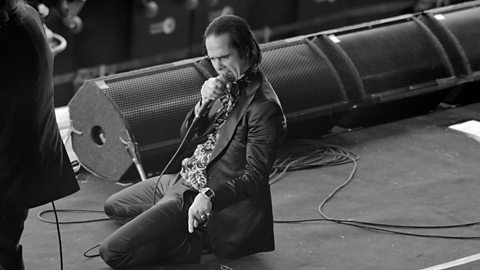
"I'm not particularly musical."
Nick Cave talks about having a weird confidence in his own genius.
8. His family has been the biggest influence on his writing
Cave has experienced great tragedy in his life. In 2015, his son Arthur died after falling from a cliff, aged 15. His son Jethro died in 2022, aged 31. Cave has written music about both losses. “Things that happen in life – meeting my wife, having children, some of my children dying – these events are the radical engines of my creativity,” he says. He and his wife Susie have been together for over 25 years. He says Susie initially found it “difficult to some degree” that Cave’s grief was being expressed in song and experienced in public, but he says she then “found it helpful. And she also understood it was helpful to others.”
I do feel a sense of duty... to continue for as long as it feels like I’m doing something of value.Nick Cave
9. He often considers retirement
At the age of 65, Cave says he sometimes thinks about giving up music. “I don’t mind the idea of retirement,” he says. “I often talk to Susie about this. It’s difficult sometimes, all this stuff. At times it’s extremely intense to be in my business… The desire to step back from the public eye is immense sometimes.” However, he’s not quitting yet. “I do feel a sense of duty, to my audience and to my craft, to continue for as long as it feels like I’m doing something of value.”
Listen to the full interview with Nick Cave on This Cultural Life here
More from Βι¶ΉΤΌΕΔ Radio 4
-
![]()
Soul Music: Into My Arms by Nick Cave
Into My Arms was released in 1997 on The Boatman's Call album by Nick Cave and The Bad Seeds.
-
![]()
This Cultural Life: Baaba Maal
Senegalese singing star Baaba Maal talks to John Wilson about his formative influences.
-
![]()
This Cultural Life: Eliza Carthy
Folk musician Eliza Carthy reveals her formative cultural influences.
-
![]()
A Broken Hallelujah: Leonard Cohen's Secret Chord
A biography by Liel Leibovitz explores the life, work and passion of the poet-turned-musician.
